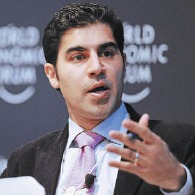Landmark project's scope and importance emphasized by author

"You can obviously see the catalytic and multiplier effect of infrastructure on economic growth, consumption, urbanization, diversification and job creation."
Khanna believes much of the coverage of the initiative in the Western media has been "skewed, wrong and not fact-based", particularly when it relates to countries getting into debt to China.
He cites the example of Hambantota Port in Sri Lanka, which was built and funded by China and subsequently leased to it for 99 years in 2017.
"The reason the port was leased to China was to pay off debts to the rest of the world because they were coming due. It was not to pay off debts to China," he said.
He points out that less than 20 percent of the outstanding debt of Pakistan, an important BRI country with its China-Pakistan Economic Corridor infrastructure projects, is actually owed to China.
"Pakistan can go to the IMF if it feels it has to, it can go to Saudi Arabia and other friends and raise the capital necessary to reduce its exposure to China at any time," he said.
Khanna said he is shocked by just how many misperceptions there are about the initiative, "despite the fact that all the data is out there and not difficult to find."
He said that despite some of the resistance to the initiative coming from the United States, many US companies are very enthusiastic about it.
"I had a meeting with about 14 chief supply chain officers of some of the biggest companies in the world in Frankfurt recently, and each of them had a Belt and Road strategy and angle and could see the benefits of it," he said.
"A number of US companies think it is brilliant and the best thing that has ever happened to them because of the business opportunities it creates."
Khanna said the initiative is vital for developing countries, particularly those in Africa.
"Africa is never going to the world's factory floor, because the robots are coming and manufacturing labor will not be needed there," he said.
"What Africa needs is to have infrastructure so that it can have a service economy to enable people to move freely across the continent and work in retail, education and healthcare. This is where Africa is headed, but they will never get there without a road."





































